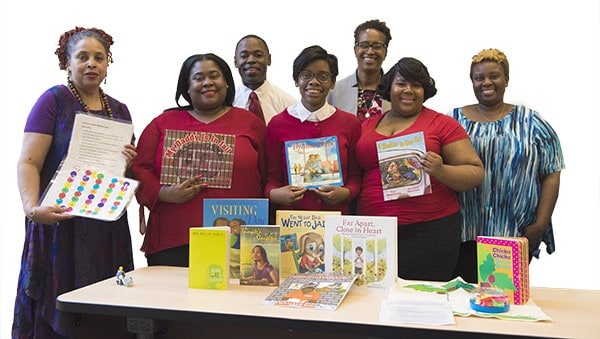Bringing Hope to Homeless Children

Trinity graduate Renetta Davis ’05, managing director of the Playtime Project (far right), with Trinity faculty and students (left to right): Dr. Cynthia Greer, Aiesha Smith, Keith Gethers, Christian Green, Dr. Deborah Haskins, and Porsche Norman.
The disappearance of 8-year-old Relisha Rudd in 2014 sent shockwaves through the Washington, D.C., area. Rudd had been living in the homeless shelter at D.C. General, and several weeks had gone by before it was reported that she was missing. The search for her was unsuccessful, and she remains missing to this day.
Dr. Cynthia Greer, associate professor in Trinity’s School of Education, remembers following the story as it was unfolding and feeling “outraged.” The story cast a bright light on homelessness in Washington, D.C., and the living conditions in shelters like D.C. General.
“In the nation’s capital, we have this awful situation where we are housing people in an old hospital across the street from a jail,” says Greer, noting the proximity of D.C. General to the D.C. Jail and how that is a startling representation of the prison pipeline.
Greer decided to channel her anger into action by reaching out to Jamila Larson, co-founder and executive director of The Homeless Children’s Playtime Project. The organization’s focus is supporting homeless children in Washington by providing them with play programming. Healthy development is their overall goal for these children, who often endure a variety of traumatic experiences throughout their young lives. When Greer first contacted the Playtime Project, they had just completed the construction of a new playground outside of D.C. General.
Trinity’s School of Education faculty recognized a unique opportunity for their students to work with the Playtime Project. Their first initiative involved a special education class in which the students observed how children used the new playground at D.C. General. Applying what they learned in class, the students developed play activities for the children to utilize.
This new partnership with Playtime Project aligned perfectly with the School of Education’s commitment to pursuing social justice in the local community, while also giving its graduate students hands-on learning opportunities.
“We want to help the children, and we want our students to learn about these issues,” says Greer.
The work with the Playtime Project inspired a year-long School of Education theme on homelessness. Since then, the School of Education has adopted several annual social justice themes, which have been infused into class curricula and inspired a number of on-campus events.
Although faculty and students have turned their attention to a variety of other issues in the years since 2014, their connection to the Playtime Project has only grown stronger. Students from Trinity’s teacher preparation programs have also developed literacy play kits.
Renetta Davis ’05, who earned her bachelor’s degree in Trinity’s College of Arts and Sciences, is the managing director of the Playtime Project. She provided feedback to the students as they were designing the literacy kits, which were then distributed to children in shelters through the Playtime Project.
According to Davis, the beauty of these kits is that they are fairly small and children can hold onto them even when they are moving from one living quarters to another. These particular kits are self-directing so that children can use them by themselves or with other children, without the help of a parent. Within the past year, Trinity students have also developed “mommy and me” kits designed for mothers to use with infant children. All kits come with instructions that are written by the students.
Students preparing to become teachers are not the only ones working with the Playtime Project. Dr. Deborah Haskins, director of the School of Education’s master’s in counseling program, has spent the past year weaving social justice into the curriculum of her courses by highlighting mass incarceration and how counselors can support the families of incarcerated individuals. Her students were able to apply what they had learned by developing a professional development training for the staff and volunteers of the Playtime Project. From this training, participants from the Playtime Project learned how to best support people in shelters who have incarcerated family members.
“We’re a small organization,” says Davis, noting the Project’s limited capacity for professional development of its staff. “Being able to outsource trainings like this to students who are being taught and supported by Trinity professors is awesome.”
Trinity’s counseling program has also helped the Playtime Project to incorporate therapeutic play into their work. Margot Beezer ’03, who earned a master’s degree in educational administration from Trinity, is currently a student in the master’s program in clinical mental health counseling. She will draw on the lessons from courses such as “Expressive Arts in Counseling” when helping with the initiative this summer as Playtime Project’s first paid intern from Trinity.
Porsche Norman, another clinical mental health counseling master’s student, completed her counseling practicum with the Playtime Project and was also one of the students who helped with the incarceration training. Her experiences taught her “patience and humility,” among other invaluable life lessons that go beyond coursework and professional training.
“I learned that there is a process with any human being of building rapport and trust,” says Norman. “I was able to see how much we all relate, and how much we all want to be heard and appreciated.”